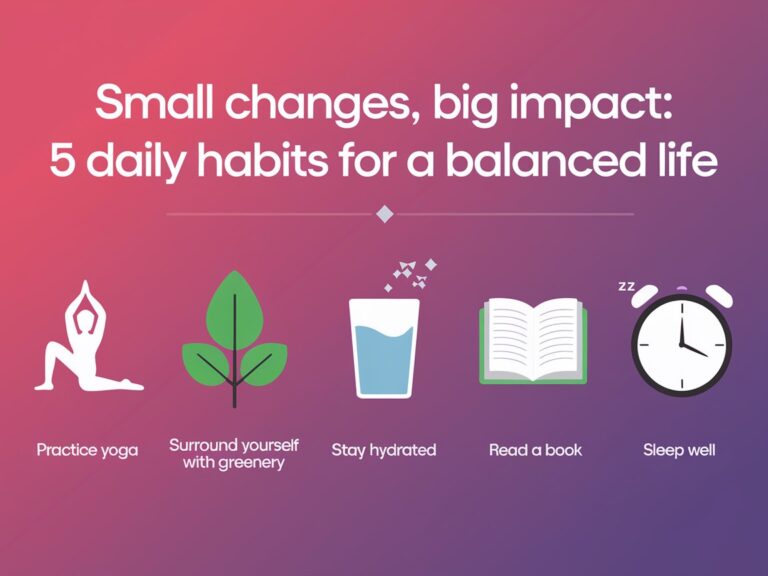How to Reduce Stress: 7 Proven Tips for 100%
Guaranteed Results to Feel Relaxed
In today’s fast-paced world, stress has become an unwelcome companion for many.
It creeps in through tight deadlines, overwhelming responsibilities, and the constant buzz of technology, impacting our physical and mental well-being.
Chronic stress can lead to anxiety, depression, and even serious health issues.
Therefore, it’s essential to develop effective strategies for stress reduction that can seamlessly fit into our lives.
In this article, we’ll explore seven proven tips that promise 100% guaranteed results for feeling more relaxed and at ease.
Tip 1: Practice Mindfulness
Mindfulness is the practice of being present in the moment, fully engaging with your thoughts, feelings, and surroundings without judgment. It’s a powerful tool for reducing stress as it helps ground you and clears your mind of clutter. Studies show that mindfulness can lower cortisol levels—the stress hormone—promoting relaxation and overall well-being.
- Simple Techniques for Mindfulness:
- Find a quiet space.
- Sit comfortably and focus on your breath.
- Inhale deeply through your nose, hold for a moment, and exhale slowly through your mouth.
- If your mind wanders, gently bring your focus back to your breath.
You can also try guided meditations available through apps like Headspace or Calm, which provide structured practices for beginners.
Tip 2: Get Moving
Physical activity is not only crucial for maintaining physical health but also plays a vital role in reducing stress. When you exercise, your body releases endorphins, neurotransmitters that act as natural mood lifters. Regular physical activity can improve your mood, boost self-esteem, and help you manage anxiety.
- Ways to Get Moving:
- Go for a brisk walk.
- Join a yoga class.
- Dance to your favorite songs at home.
You don’t have to engage in high-intensity workouts to reap these benefits. Aim for at least 30 minutes of moderate exercise most days of the week. By making movement a regular part of your life, you can create a positive feedback loop that enhances your mental health.
Tip 3: Connect with Nature
Spending time in nature can have a profound impact on stress levels. Nature provides a serene escape from the chaos of daily life and has been shown to lower stress hormones, improve mood, and enhance feelings of well-being. Studies indicate that even a short walk in a park can lead to significant reductions in stress.
- Ways to Connect with Nature:
- Take a stroll in a nearby park.
- Go for a hike.
- Sit outside and enjoy the fresh air.
Engage your senses—listen to the sounds of birds, feel the breeze on your skin, and take in the sights of vibrant flowers. This connection can ground you and provide a much-needed mental reset.
Tip 4: Stay Organized
One of the leading causes of stress is feeling overwhelmed by tasks and responsibilities. Staying organized can significantly reduce feelings of chaos and help you regain control over your life. A well-structured environment promotes clarity and efficiency, making it easier to tackle your daily challenges.
- Tips for Staying Organized:
- Keep a planner or digital calendar to track important deadlines and appointments.
- Break larger tasks into smaller, manageable steps.
- Prioritize tasks based on urgency and importance.
- Set aside specific times for work, relaxation, and self-care.
Additionally, decluttering your space can have a calming effect; a tidy environment can contribute to a tidy mind.
Tip 5: Limit Screen Time
In our technology-driven world, it’s easy to find ourselves glued to our screens, whether for work or leisure. However, excessive screen time can lead to information overload and mental fatigue, increasing stress levels. It’s essential to set boundaries and take regular breaks from screens to promote mental well-being.
- Strategies to Limit Screen Time:
- Designate specific times of the day to unplug from technology.
- Set aside the first hour after waking and the last hour before bed as screen-free times.
- Engage in activities that promote relaxation, such as reading, journaling, or spending time with loved ones.
Additionally, be mindful of your social media usage; curating your feeds to follow positive and uplifting content can also help reduce stress.
Tip 6: Practice Gratitude
Cultivating gratitude can shift your perspective and significantly enhance your emotional well-being. Research shows that practicing gratitude can lead to increased happiness, improved relationships, and reduced stress. By focusing on the positive aspects of your life, you can create a buffer against stressors.
- Ways to Practice Gratitude:
- Keep a gratitude journal; each day, write down three things you’re grateful for—big or small.
- Reflect on positive moments in your life to shift your mindset away from negativity.
- Express gratitude verbally by thanking those around you for their support.
Fostering a sense of connection and community can further enhance the benefits of gratitude.
Tip 7: Reach Out for Support
Social support is a crucial component of stress management. Sharing your feelings and experiences with friends or family can provide relief and perspective, reminding you that you’re not alone in facing life’s challenges. Having a strong support network can buffer against stress and promote resilience.
- Ways to Seek Support:
- Talk to someone you trust about your feelings.
- Join support groups, either in person or online, where you can connect with others who understand what you’re going through.
- Don’t hesitate to seek professional help if needed.
Remember, seeking support is a sign of strength, not weakness.
Conclusion
Incorporating these seven proven tips into your daily life can help you effectively manage stress and cultivate a greater sense of relaxation and well-being. By practicing mindfulness, engaging in physical activity, connecting with nature, staying organized, limiting screen time, practicing gratitude, and reaching out for support, you can create a holistic approach to stress reduction.
Stress is a natural part of life, but it doesn’t have to control you. Take the time to experiment with these strategies and discover which resonate most with you. With consistent practice, you can develop healthier coping mechanisms that promote a calmer, more relaxed state of mind. Embrace the journey toward stress management and enjoy the positive changes it brings to your life.



